Political Philosophy
VerifiedAdded on 2023/06/10
|10
|2651
|260
AI Summary
This article explores the political philosophies of anarchism, fascism, and totalitarianism. It discusses the ideologies and conceptions of the state or government that each philosophy holds. The article also analyzes the distinctive features of totalitarianism according to Hannah Arendt's book, 'The Origins of Totalitarianism.'
Contribute Materials
Your contribution can guide someone’s learning journey. Share your
documents today.
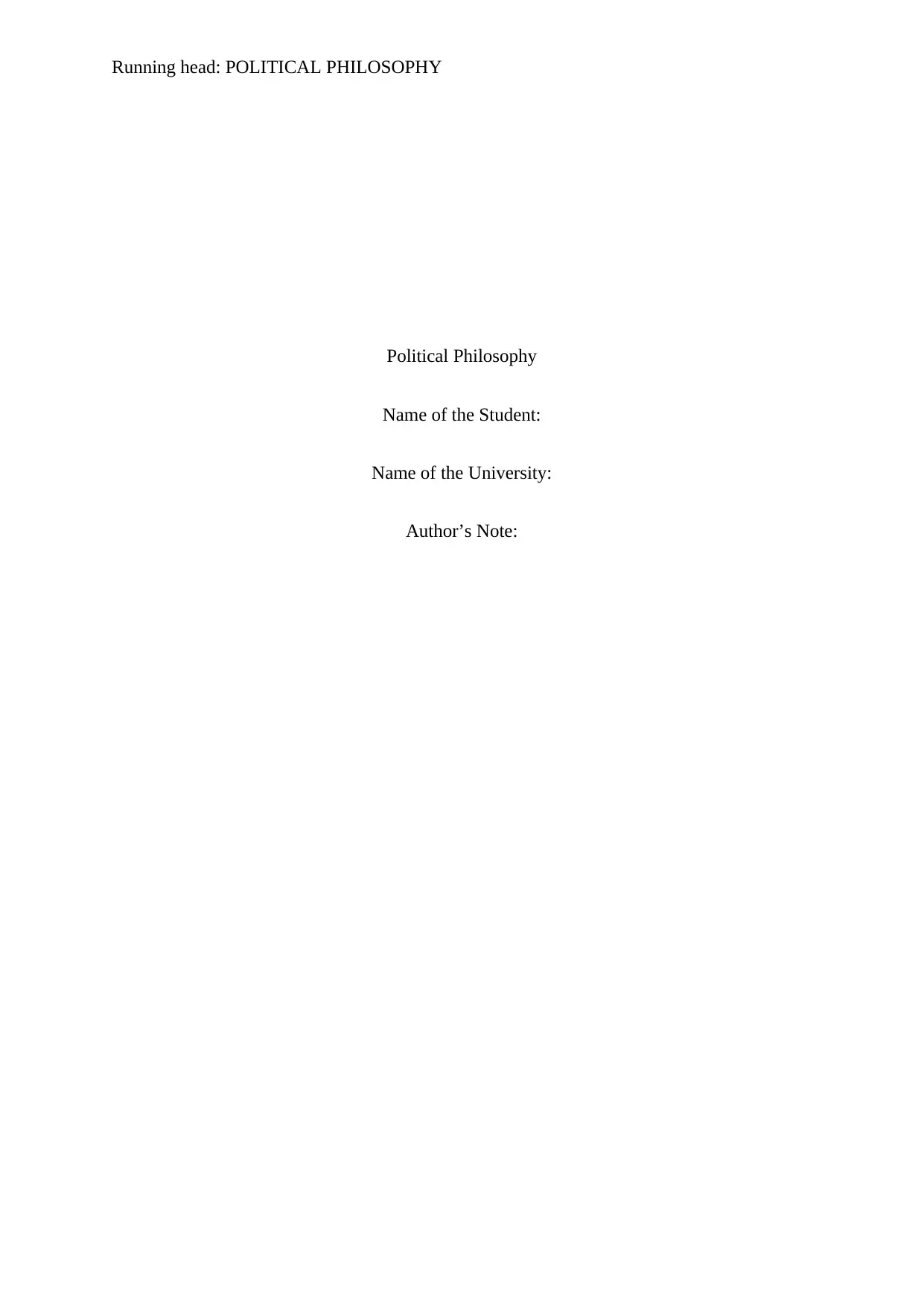
Running head: POLITICAL PHILOSOPHY
Political Philosophy
Name of the Student:
Name of the University:
Author’s Note:
Political Philosophy
Name of the Student:
Name of the University:
Author’s Note:
Secure Best Marks with AI Grader
Need help grading? Try our AI Grader for instant feedback on your assignments.
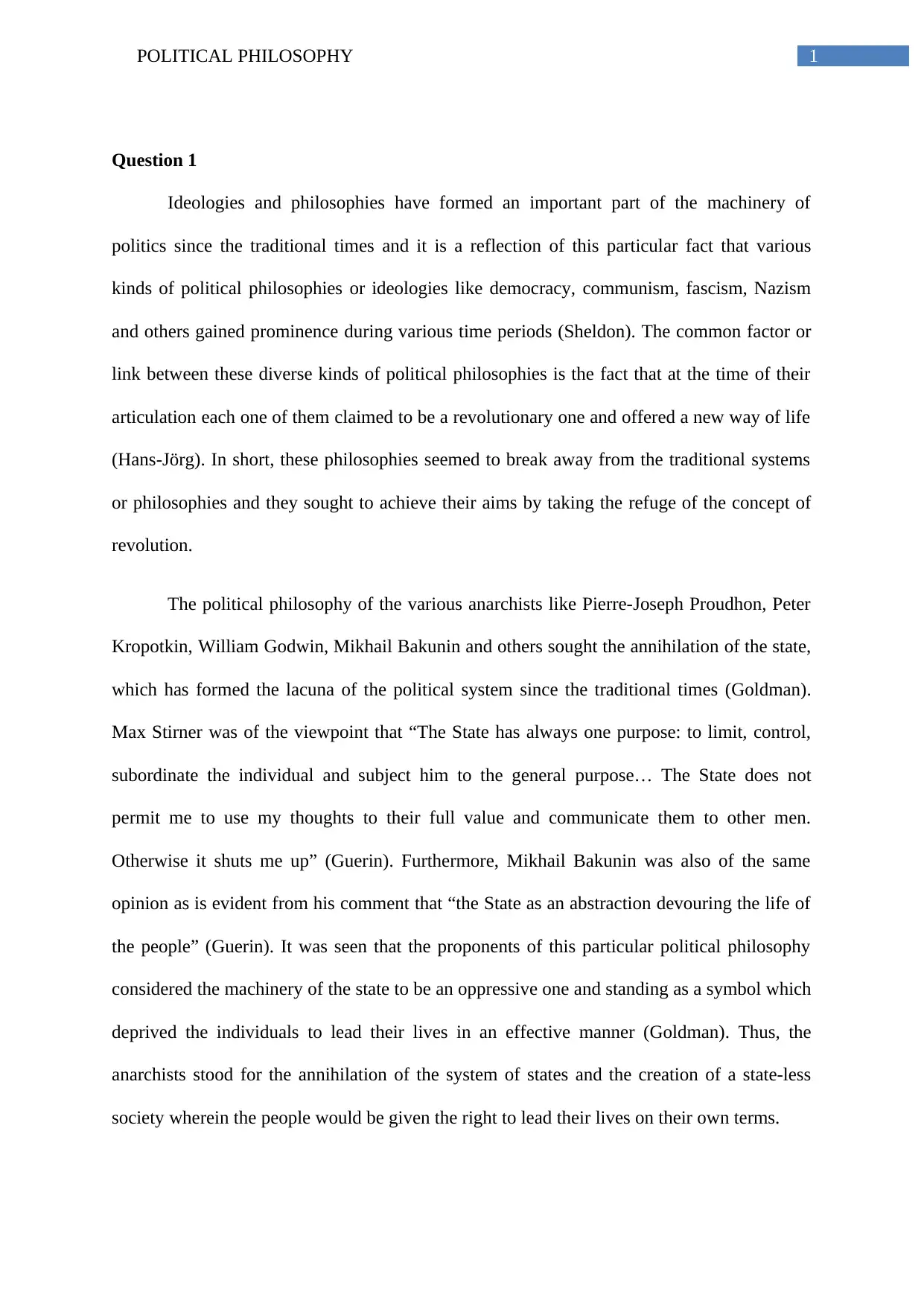
1POLITICAL PHILOSOPHY
Question 1
Ideologies and philosophies have formed an important part of the machinery of
politics since the traditional times and it is a reflection of this particular fact that various
kinds of political philosophies or ideologies like democracy, communism, fascism, Nazism
and others gained prominence during various time periods (Sheldon). The common factor or
link between these diverse kinds of political philosophies is the fact that at the time of their
articulation each one of them claimed to be a revolutionary one and offered a new way of life
(Hans-Jörg). In short, these philosophies seemed to break away from the traditional systems
or philosophies and they sought to achieve their aims by taking the refuge of the concept of
revolution.
The political philosophy of the various anarchists like Pierre-Joseph Proudhon, Peter
Kropotkin, William Godwin, Mikhail Bakunin and others sought the annihilation of the state,
which has formed the lacuna of the political system since the traditional times (Goldman).
Max Stirner was of the viewpoint that “The State has always one purpose: to limit, control,
subordinate the individual and subject him to the general purpose… The State does not
permit me to use my thoughts to their full value and communicate them to other men.
Otherwise it shuts me up” (Guerin). Furthermore, Mikhail Bakunin was also of the same
opinion as is evident from his comment that “the State as an abstraction devouring the life of
the people” (Guerin). It was seen that the proponents of this particular political philosophy
considered the machinery of the state to be an oppressive one and standing as a symbol which
deprived the individuals to lead their lives in an effective manner (Goldman). Thus, the
anarchists stood for the annihilation of the system of states and the creation of a state-less
society wherein the people would be given the right to lead their lives on their own terms.
Question 1
Ideologies and philosophies have formed an important part of the machinery of
politics since the traditional times and it is a reflection of this particular fact that various
kinds of political philosophies or ideologies like democracy, communism, fascism, Nazism
and others gained prominence during various time periods (Sheldon). The common factor or
link between these diverse kinds of political philosophies is the fact that at the time of their
articulation each one of them claimed to be a revolutionary one and offered a new way of life
(Hans-Jörg). In short, these philosophies seemed to break away from the traditional systems
or philosophies and they sought to achieve their aims by taking the refuge of the concept of
revolution.
The political philosophy of the various anarchists like Pierre-Joseph Proudhon, Peter
Kropotkin, William Godwin, Mikhail Bakunin and others sought the annihilation of the state,
which has formed the lacuna of the political system since the traditional times (Goldman).
Max Stirner was of the viewpoint that “The State has always one purpose: to limit, control,
subordinate the individual and subject him to the general purpose… The State does not
permit me to use my thoughts to their full value and communicate them to other men.
Otherwise it shuts me up” (Guerin). Furthermore, Mikhail Bakunin was also of the same
opinion as is evident from his comment that “the State as an abstraction devouring the life of
the people” (Guerin). It was seen that the proponents of this particular political philosophy
considered the machinery of the state to be an oppressive one and standing as a symbol which
deprived the individuals to lead their lives in an effective manner (Goldman). Thus, the
anarchists stood for the annihilation of the system of states and the creation of a state-less
society wherein the people would be given the right to lead their lives on their own terms.
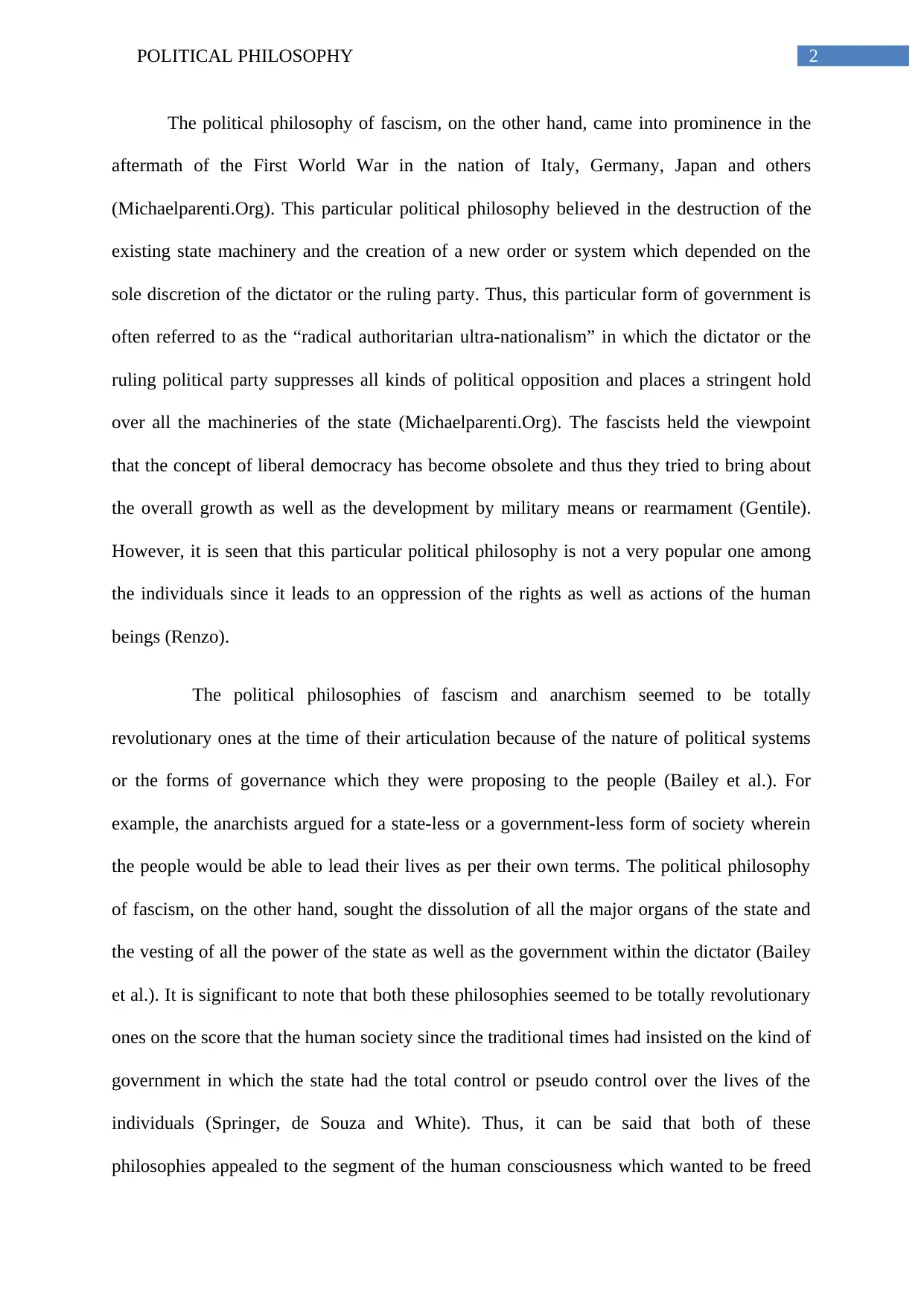
2POLITICAL PHILOSOPHY
The political philosophy of fascism, on the other hand, came into prominence in the
aftermath of the First World War in the nation of Italy, Germany, Japan and others
(Michaelparenti.Org). This particular political philosophy believed in the destruction of the
existing state machinery and the creation of a new order or system which depended on the
sole discretion of the dictator or the ruling party. Thus, this particular form of government is
often referred to as the “radical authoritarian ultra-nationalism” in which the dictator or the
ruling political party suppresses all kinds of political opposition and places a stringent hold
over all the machineries of the state (Michaelparenti.Org). The fascists held the viewpoint
that the concept of liberal democracy has become obsolete and thus they tried to bring about
the overall growth as well as the development by military means or rearmament (Gentile).
However, it is seen that this particular political philosophy is not a very popular one among
the individuals since it leads to an oppression of the rights as well as actions of the human
beings (Renzo).
The political philosophies of fascism and anarchism seemed to be totally
revolutionary ones at the time of their articulation because of the nature of political systems
or the forms of governance which they were proposing to the people (Bailey et al.). For
example, the anarchists argued for a state-less or a government-less form of society wherein
the people would be able to lead their lives as per their own terms. The political philosophy
of fascism, on the other hand, sought the dissolution of all the major organs of the state and
the vesting of all the power of the state as well as the government within the dictator (Bailey
et al.). It is significant to note that both these philosophies seemed to be totally revolutionary
ones on the score that the human society since the traditional times had insisted on the kind of
government in which the state had the total control or pseudo control over the lives of the
individuals (Springer, de Souza and White). Thus, it can be said that both of these
philosophies appealed to the segment of the human consciousness which wanted to be freed
The political philosophy of fascism, on the other hand, came into prominence in the
aftermath of the First World War in the nation of Italy, Germany, Japan and others
(Michaelparenti.Org). This particular political philosophy believed in the destruction of the
existing state machinery and the creation of a new order or system which depended on the
sole discretion of the dictator or the ruling party. Thus, this particular form of government is
often referred to as the “radical authoritarian ultra-nationalism” in which the dictator or the
ruling political party suppresses all kinds of political opposition and places a stringent hold
over all the machineries of the state (Michaelparenti.Org). The fascists held the viewpoint
that the concept of liberal democracy has become obsolete and thus they tried to bring about
the overall growth as well as the development by military means or rearmament (Gentile).
However, it is seen that this particular political philosophy is not a very popular one among
the individuals since it leads to an oppression of the rights as well as actions of the human
beings (Renzo).
The political philosophies of fascism and anarchism seemed to be totally
revolutionary ones at the time of their articulation because of the nature of political systems
or the forms of governance which they were proposing to the people (Bailey et al.). For
example, the anarchists argued for a state-less or a government-less form of society wherein
the people would be able to lead their lives as per their own terms. The political philosophy
of fascism, on the other hand, sought the dissolution of all the major organs of the state and
the vesting of all the power of the state as well as the government within the dictator (Bailey
et al.). It is significant to note that both these philosophies seemed to be totally revolutionary
ones on the score that the human society since the traditional times had insisted on the kind of
government in which the state had the total control or pseudo control over the lives of the
individuals (Springer, de Souza and White). Thus, it can be said that both of these
philosophies appealed to the segment of the human consciousness which wanted to be freed
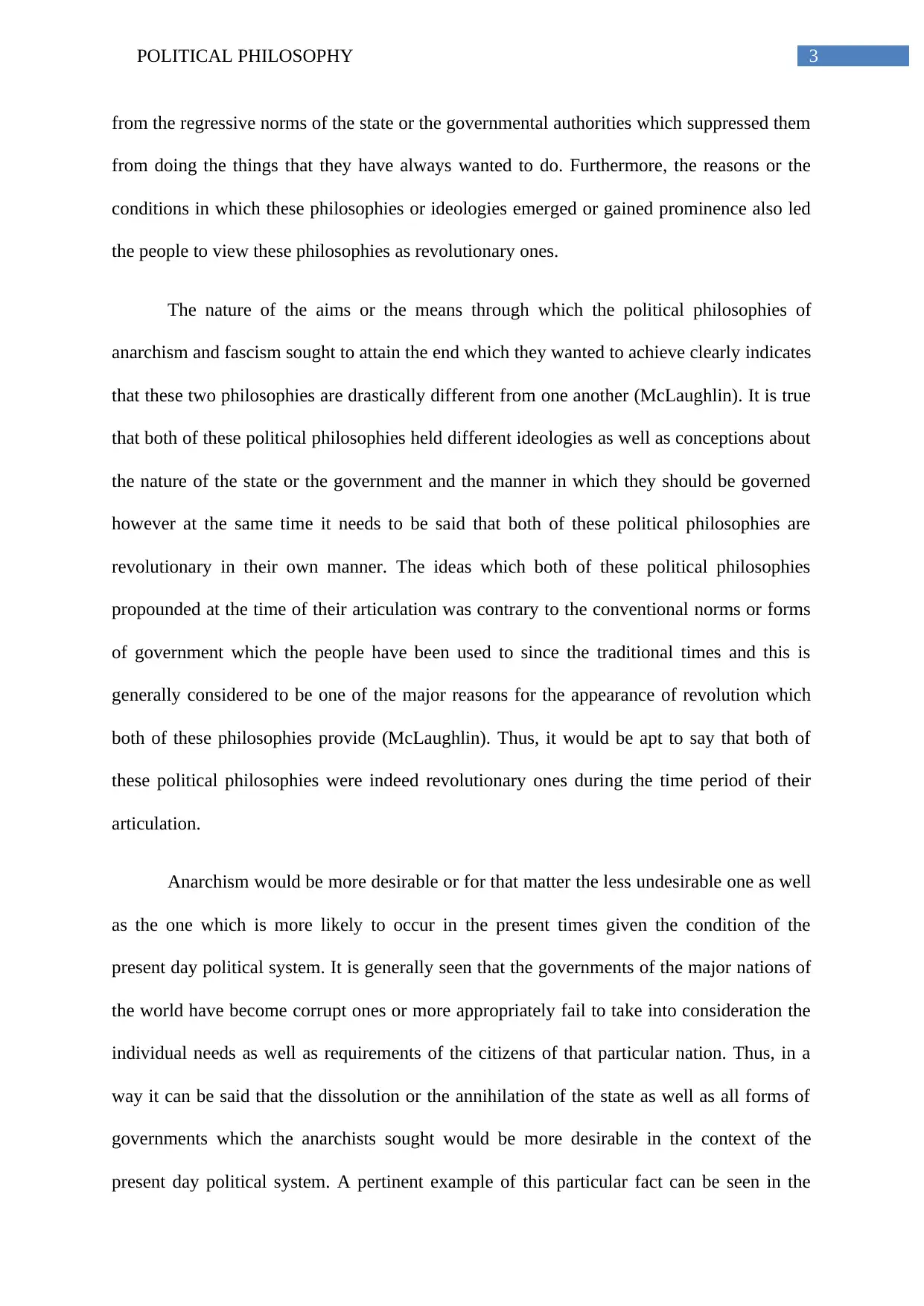
3POLITICAL PHILOSOPHY
from the regressive norms of the state or the governmental authorities which suppressed them
from doing the things that they have always wanted to do. Furthermore, the reasons or the
conditions in which these philosophies or ideologies emerged or gained prominence also led
the people to view these philosophies as revolutionary ones.
The nature of the aims or the means through which the political philosophies of
anarchism and fascism sought to attain the end which they wanted to achieve clearly indicates
that these two philosophies are drastically different from one another (McLaughlin). It is true
that both of these political philosophies held different ideologies as well as conceptions about
the nature of the state or the government and the manner in which they should be governed
however at the same time it needs to be said that both of these political philosophies are
revolutionary in their own manner. The ideas which both of these political philosophies
propounded at the time of their articulation was contrary to the conventional norms or forms
of government which the people have been used to since the traditional times and this is
generally considered to be one of the major reasons for the appearance of revolution which
both of these philosophies provide (McLaughlin). Thus, it would be apt to say that both of
these political philosophies were indeed revolutionary ones during the time period of their
articulation.
Anarchism would be more desirable or for that matter the less undesirable one as well
as the one which is more likely to occur in the present times given the condition of the
present day political system. It is generally seen that the governments of the major nations of
the world have become corrupt ones or more appropriately fail to take into consideration the
individual needs as well as requirements of the citizens of that particular nation. Thus, in a
way it can be said that the dissolution or the annihilation of the state as well as all forms of
governments which the anarchists sought would be more desirable in the context of the
present day political system. A pertinent example of this particular fact can be seen in the
from the regressive norms of the state or the governmental authorities which suppressed them
from doing the things that they have always wanted to do. Furthermore, the reasons or the
conditions in which these philosophies or ideologies emerged or gained prominence also led
the people to view these philosophies as revolutionary ones.
The nature of the aims or the means through which the political philosophies of
anarchism and fascism sought to attain the end which they wanted to achieve clearly indicates
that these two philosophies are drastically different from one another (McLaughlin). It is true
that both of these political philosophies held different ideologies as well as conceptions about
the nature of the state or the government and the manner in which they should be governed
however at the same time it needs to be said that both of these political philosophies are
revolutionary in their own manner. The ideas which both of these political philosophies
propounded at the time of their articulation was contrary to the conventional norms or forms
of government which the people have been used to since the traditional times and this is
generally considered to be one of the major reasons for the appearance of revolution which
both of these philosophies provide (McLaughlin). Thus, it would be apt to say that both of
these political philosophies were indeed revolutionary ones during the time period of their
articulation.
Anarchism would be more desirable or for that matter the less undesirable one as well
as the one which is more likely to occur in the present times given the condition of the
present day political system. It is generally seen that the governments of the major nations of
the world have become corrupt ones or more appropriately fail to take into consideration the
individual needs as well as requirements of the citizens of that particular nation. Thus, in a
way it can be said that the dissolution or the annihilation of the state as well as all forms of
governments which the anarchists sought would be more desirable in the context of the
present day political system. A pertinent example of this particular fact can be seen in the
Secure Best Marks with AI Grader
Need help grading? Try our AI Grader for instant feedback on your assignments.
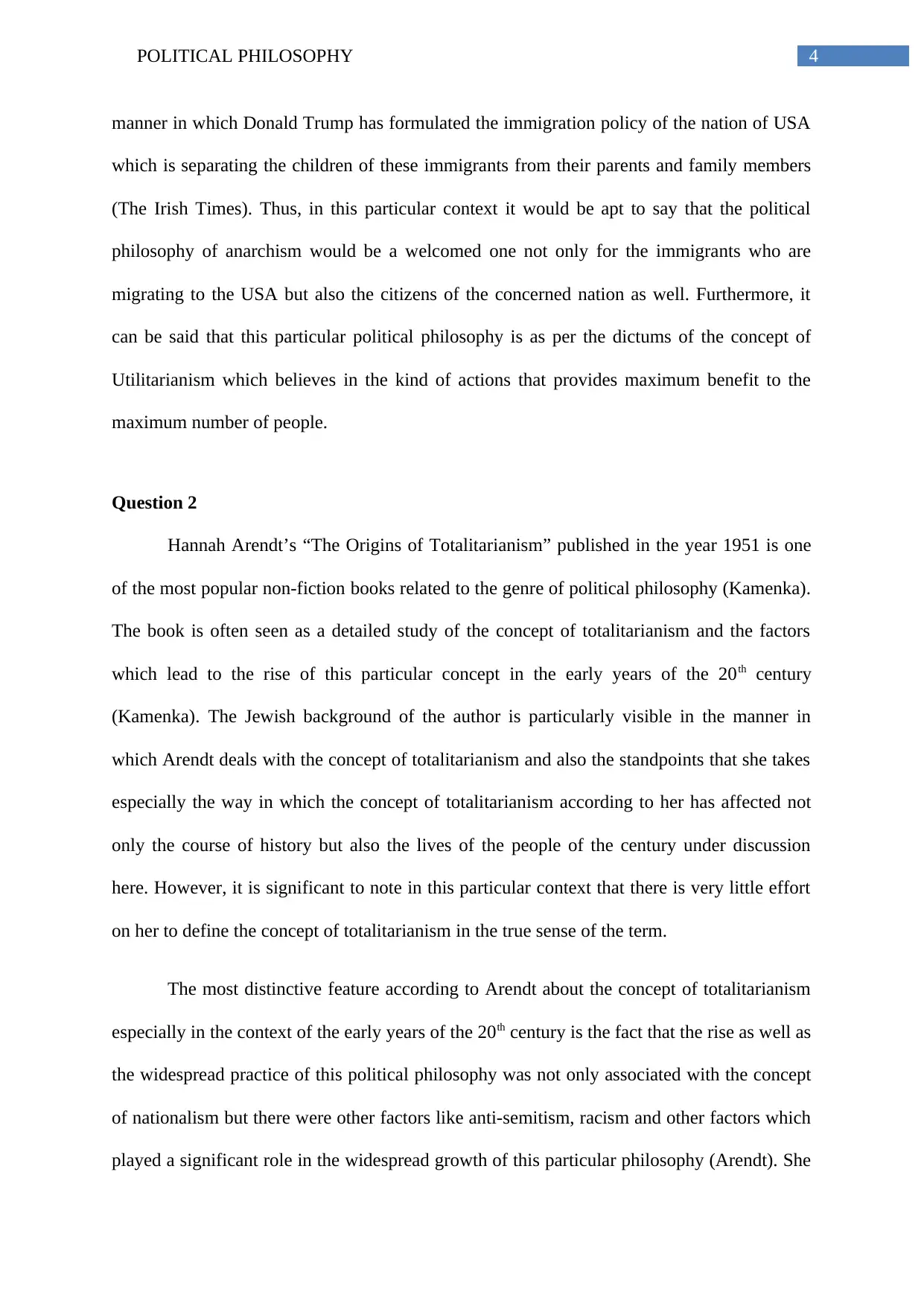
4POLITICAL PHILOSOPHY
manner in which Donald Trump has formulated the immigration policy of the nation of USA
which is separating the children of these immigrants from their parents and family members
(The Irish Times). Thus, in this particular context it would be apt to say that the political
philosophy of anarchism would be a welcomed one not only for the immigrants who are
migrating to the USA but also the citizens of the concerned nation as well. Furthermore, it
can be said that this particular political philosophy is as per the dictums of the concept of
Utilitarianism which believes in the kind of actions that provides maximum benefit to the
maximum number of people.
Question 2
Hannah Arendt’s “The Origins of Totalitarianism” published in the year 1951 is one
of the most popular non-fiction books related to the genre of political philosophy (Kamenka).
The book is often seen as a detailed study of the concept of totalitarianism and the factors
which lead to the rise of this particular concept in the early years of the 20th century
(Kamenka). The Jewish background of the author is particularly visible in the manner in
which Arendt deals with the concept of totalitarianism and also the standpoints that she takes
especially the way in which the concept of totalitarianism according to her has affected not
only the course of history but also the lives of the people of the century under discussion
here. However, it is significant to note in this particular context that there is very little effort
on her to define the concept of totalitarianism in the true sense of the term.
The most distinctive feature according to Arendt about the concept of totalitarianism
especially in the context of the early years of the 20th century is the fact that the rise as well as
the widespread practice of this political philosophy was not only associated with the concept
of nationalism but there were other factors like anti-semitism, racism and other factors which
played a significant role in the widespread growth of this particular philosophy (Arendt). She
manner in which Donald Trump has formulated the immigration policy of the nation of USA
which is separating the children of these immigrants from their parents and family members
(The Irish Times). Thus, in this particular context it would be apt to say that the political
philosophy of anarchism would be a welcomed one not only for the immigrants who are
migrating to the USA but also the citizens of the concerned nation as well. Furthermore, it
can be said that this particular political philosophy is as per the dictums of the concept of
Utilitarianism which believes in the kind of actions that provides maximum benefit to the
maximum number of people.
Question 2
Hannah Arendt’s “The Origins of Totalitarianism” published in the year 1951 is one
of the most popular non-fiction books related to the genre of political philosophy (Kamenka).
The book is often seen as a detailed study of the concept of totalitarianism and the factors
which lead to the rise of this particular concept in the early years of the 20th century
(Kamenka). The Jewish background of the author is particularly visible in the manner in
which Arendt deals with the concept of totalitarianism and also the standpoints that she takes
especially the way in which the concept of totalitarianism according to her has affected not
only the course of history but also the lives of the people of the century under discussion
here. However, it is significant to note in this particular context that there is very little effort
on her to define the concept of totalitarianism in the true sense of the term.
The most distinctive feature according to Arendt about the concept of totalitarianism
especially in the context of the early years of the 20th century is the fact that the rise as well as
the widespread practice of this political philosophy was not only associated with the concept
of nationalism but there were other factors like anti-semitism, racism and other factors which
played a significant role in the widespread growth of this particular philosophy (Arendt). She
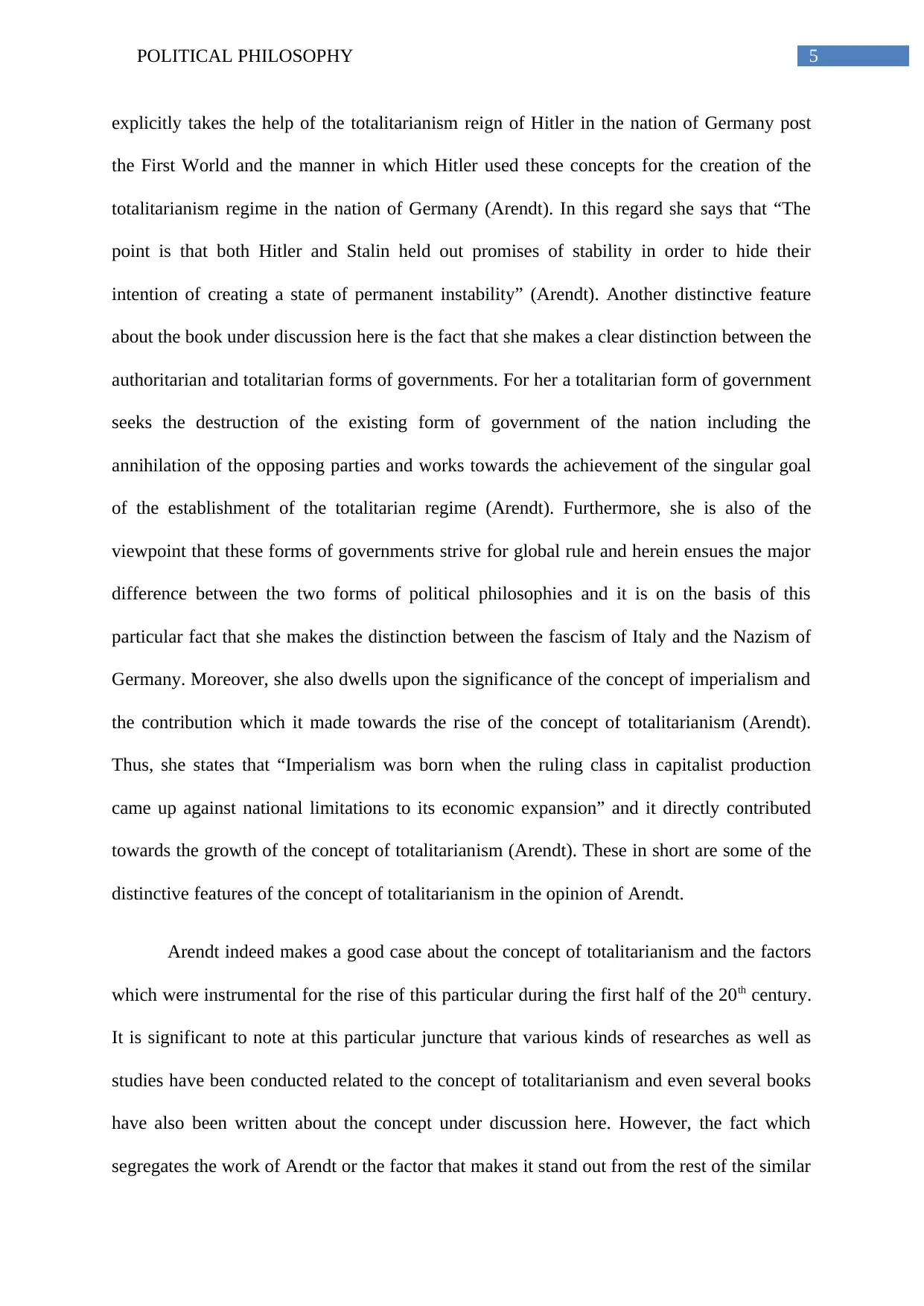
5POLITICAL PHILOSOPHY
explicitly takes the help of the totalitarianism reign of Hitler in the nation of Germany post
the First World and the manner in which Hitler used these concepts for the creation of the
totalitarianism regime in the nation of Germany (Arendt). In this regard she says that “The
point is that both Hitler and Stalin held out promises of stability in order to hide their
intention of creating a state of permanent instability” (Arendt). Another distinctive feature
about the book under discussion here is the fact that she makes a clear distinction between the
authoritarian and totalitarian forms of governments. For her a totalitarian form of government
seeks the destruction of the existing form of government of the nation including the
annihilation of the opposing parties and works towards the achievement of the singular goal
of the establishment of the totalitarian regime (Arendt). Furthermore, she is also of the
viewpoint that these forms of governments strive for global rule and herein ensues the major
difference between the two forms of political philosophies and it is on the basis of this
particular fact that she makes the distinction between the fascism of Italy and the Nazism of
Germany. Moreover, she also dwells upon the significance of the concept of imperialism and
the contribution which it made towards the rise of the concept of totalitarianism (Arendt).
Thus, she states that “Imperialism was born when the ruling class in capitalist production
came up against national limitations to its economic expansion” and it directly contributed
towards the growth of the concept of totalitarianism (Arendt). These in short are some of the
distinctive features of the concept of totalitarianism in the opinion of Arendt.
Arendt indeed makes a good case about the concept of totalitarianism and the factors
which were instrumental for the rise of this particular during the first half of the 20th century.
It is significant to note at this particular juncture that various kinds of researches as well as
studies have been conducted related to the concept of totalitarianism and even several books
have also been written about the concept under discussion here. However, the fact which
segregates the work of Arendt or the factor that makes it stand out from the rest of the similar
explicitly takes the help of the totalitarianism reign of Hitler in the nation of Germany post
the First World and the manner in which Hitler used these concepts for the creation of the
totalitarianism regime in the nation of Germany (Arendt). In this regard she says that “The
point is that both Hitler and Stalin held out promises of stability in order to hide their
intention of creating a state of permanent instability” (Arendt). Another distinctive feature
about the book under discussion here is the fact that she makes a clear distinction between the
authoritarian and totalitarian forms of governments. For her a totalitarian form of government
seeks the destruction of the existing form of government of the nation including the
annihilation of the opposing parties and works towards the achievement of the singular goal
of the establishment of the totalitarian regime (Arendt). Furthermore, she is also of the
viewpoint that these forms of governments strive for global rule and herein ensues the major
difference between the two forms of political philosophies and it is on the basis of this
particular fact that she makes the distinction between the fascism of Italy and the Nazism of
Germany. Moreover, she also dwells upon the significance of the concept of imperialism and
the contribution which it made towards the rise of the concept of totalitarianism (Arendt).
Thus, she states that “Imperialism was born when the ruling class in capitalist production
came up against national limitations to its economic expansion” and it directly contributed
towards the growth of the concept of totalitarianism (Arendt). These in short are some of the
distinctive features of the concept of totalitarianism in the opinion of Arendt.
Arendt indeed makes a good case about the concept of totalitarianism and the factors
which were instrumental for the rise of this particular during the first half of the 20th century.
It is significant to note at this particular juncture that various kinds of researches as well as
studies have been conducted related to the concept of totalitarianism and even several books
have also been written about the concept under discussion here. However, the fact which
segregates the work of Arendt or the factor that makes it stand out from the rest of the similar
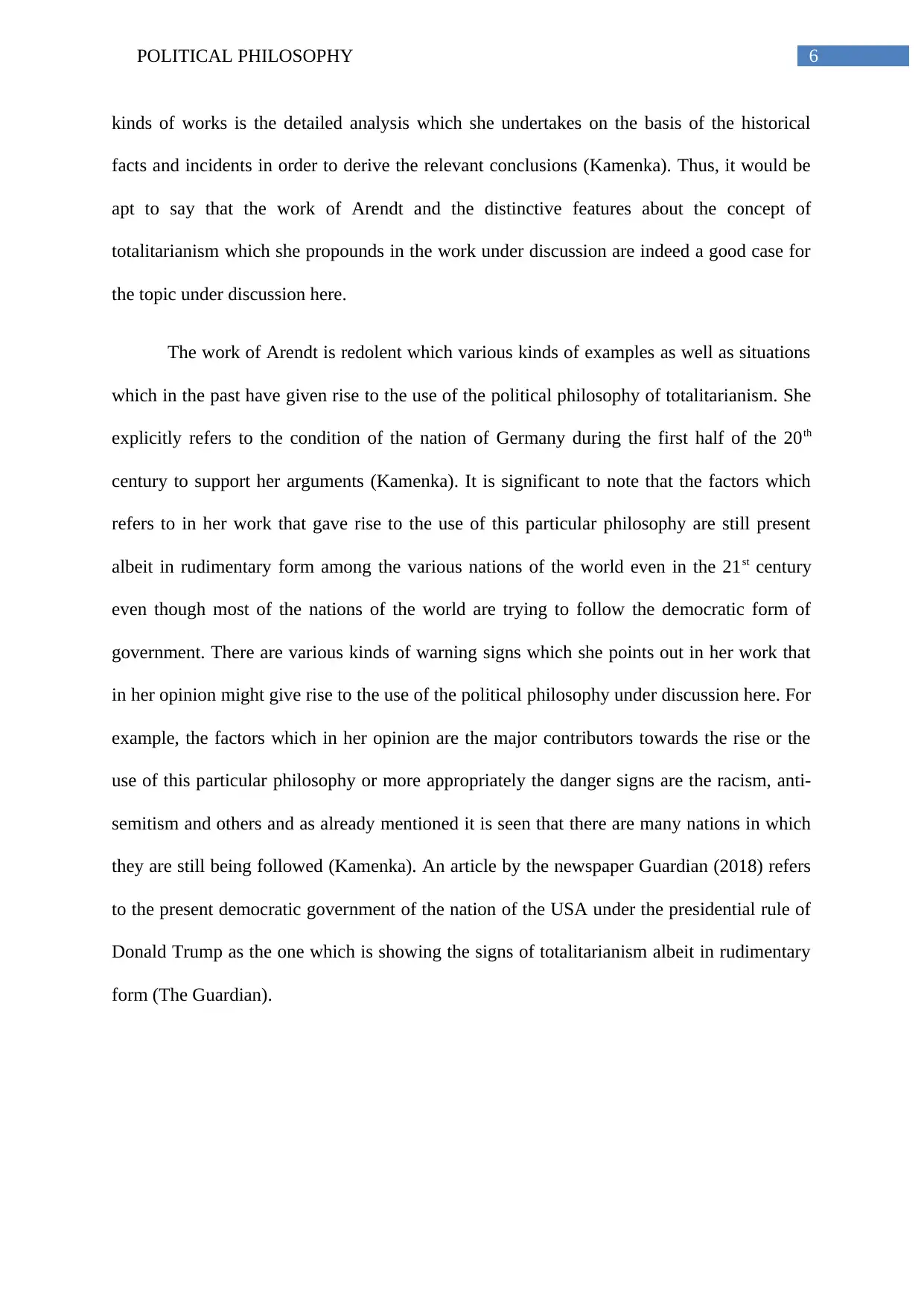
6POLITICAL PHILOSOPHY
kinds of works is the detailed analysis which she undertakes on the basis of the historical
facts and incidents in order to derive the relevant conclusions (Kamenka). Thus, it would be
apt to say that the work of Arendt and the distinctive features about the concept of
totalitarianism which she propounds in the work under discussion are indeed a good case for
the topic under discussion here.
The work of Arendt is redolent which various kinds of examples as well as situations
which in the past have given rise to the use of the political philosophy of totalitarianism. She
explicitly refers to the condition of the nation of Germany during the first half of the 20th
century to support her arguments (Kamenka). It is significant to note that the factors which
refers to in her work that gave rise to the use of this particular philosophy are still present
albeit in rudimentary form among the various nations of the world even in the 21st century
even though most of the nations of the world are trying to follow the democratic form of
government. There are various kinds of warning signs which she points out in her work that
in her opinion might give rise to the use of the political philosophy under discussion here. For
example, the factors which in her opinion are the major contributors towards the rise or the
use of this particular philosophy or more appropriately the danger signs are the racism, anti-
semitism and others and as already mentioned it is seen that there are many nations in which
they are still being followed (Kamenka). An article by the newspaper Guardian (2018) refers
to the present democratic government of the nation of the USA under the presidential rule of
Donald Trump as the one which is showing the signs of totalitarianism albeit in rudimentary
form (The Guardian).
kinds of works is the detailed analysis which she undertakes on the basis of the historical
facts and incidents in order to derive the relevant conclusions (Kamenka). Thus, it would be
apt to say that the work of Arendt and the distinctive features about the concept of
totalitarianism which she propounds in the work under discussion are indeed a good case for
the topic under discussion here.
The work of Arendt is redolent which various kinds of examples as well as situations
which in the past have given rise to the use of the political philosophy of totalitarianism. She
explicitly refers to the condition of the nation of Germany during the first half of the 20th
century to support her arguments (Kamenka). It is significant to note that the factors which
refers to in her work that gave rise to the use of this particular philosophy are still present
albeit in rudimentary form among the various nations of the world even in the 21st century
even though most of the nations of the world are trying to follow the democratic form of
government. There are various kinds of warning signs which she points out in her work that
in her opinion might give rise to the use of the political philosophy under discussion here. For
example, the factors which in her opinion are the major contributors towards the rise or the
use of this particular philosophy or more appropriately the danger signs are the racism, anti-
semitism and others and as already mentioned it is seen that there are many nations in which
they are still being followed (Kamenka). An article by the newspaper Guardian (2018) refers
to the present democratic government of the nation of the USA under the presidential rule of
Donald Trump as the one which is showing the signs of totalitarianism albeit in rudimentary
form (The Guardian).
Paraphrase This Document
Need a fresh take? Get an instant paraphrase of this document with our AI Paraphraser
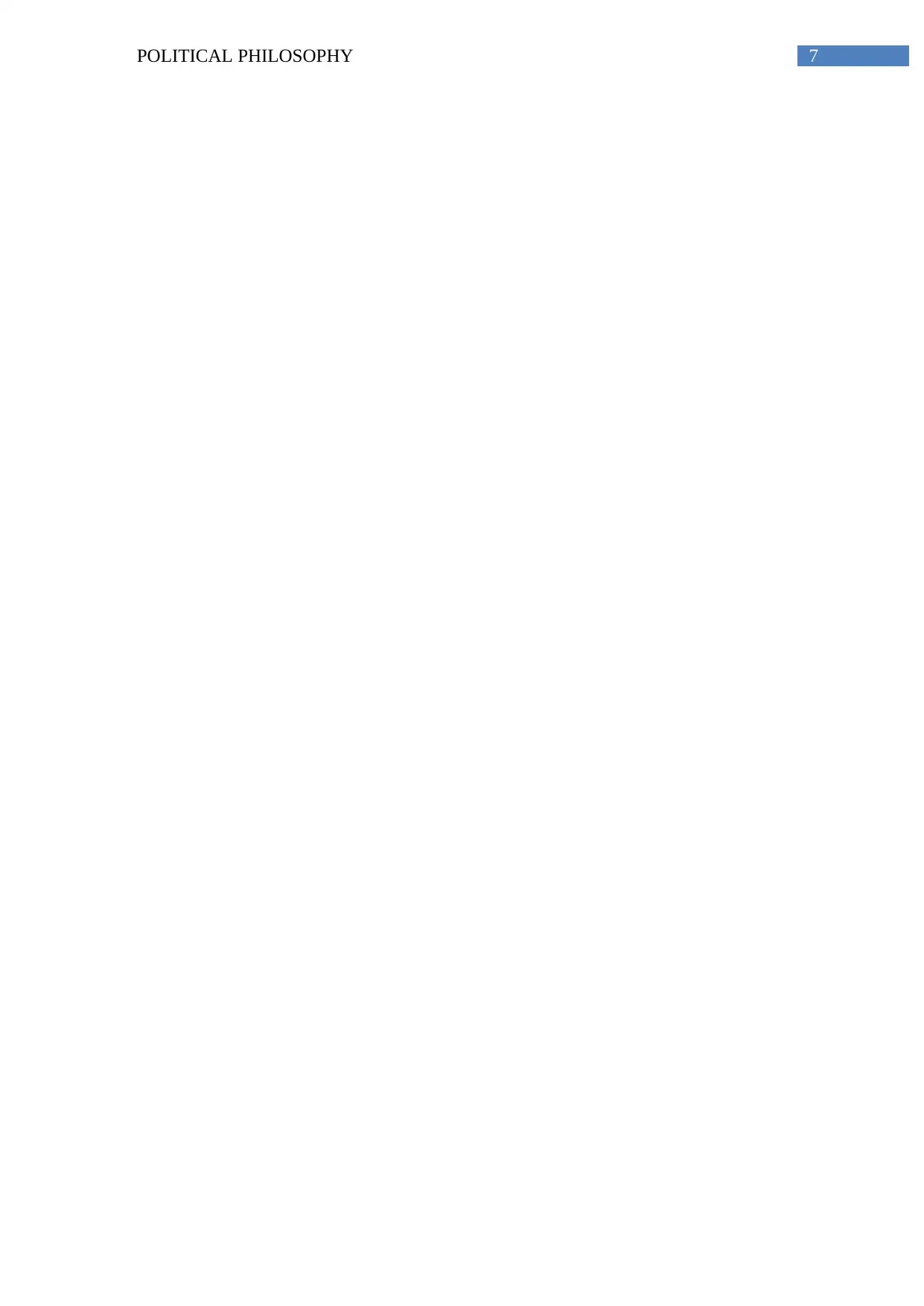
7POLITICAL PHILOSOPHY
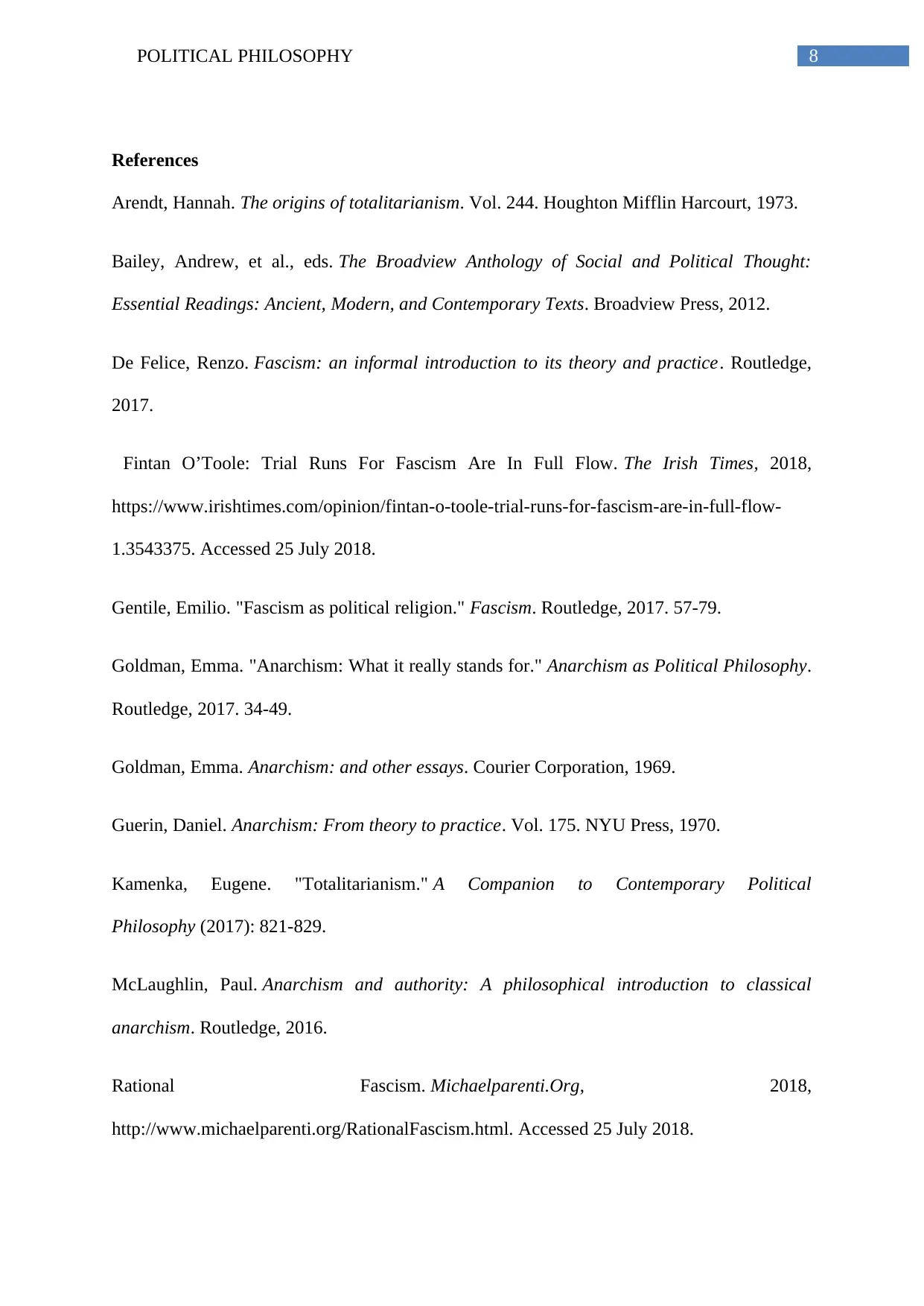
8POLITICAL PHILOSOPHY
References
Arendt, Hannah. The origins of totalitarianism. Vol. 244. Houghton Mifflin Harcourt, 1973.
Bailey, Andrew, et al., eds. The Broadview Anthology of Social and Political Thought:
Essential Readings: Ancient, Modern, and Contemporary Texts. Broadview Press, 2012.
De Felice, Renzo. Fascism: an informal introduction to its theory and practice. Routledge,
2017.
Fintan O’Toole: Trial Runs For Fascism Are In Full Flow. The Irish Times, 2018,
https://www.irishtimes.com/opinion/fintan-o-toole-trial-runs-for-fascism-are-in-full-flow-
1.3543375. Accessed 25 July 2018.
Gentile, Emilio. "Fascism as political religion." Fascism. Routledge, 2017. 57-79.
Goldman, Emma. "Anarchism: What it really stands for." Anarchism as Political Philosophy.
Routledge, 2017. 34-49.
Goldman, Emma. Anarchism: and other essays. Courier Corporation, 1969.
Guerin, Daniel. Anarchism: From theory to practice. Vol. 175. NYU Press, 1970.
Kamenka, Eugene. "Totalitarianism." A Companion to Contemporary Political
Philosophy (2017): 821-829.
McLaughlin, Paul. Anarchism and authority: A philosophical introduction to classical
anarchism. Routledge, 2016.
Rational Fascism. Michaelparenti.Org, 2018,
http://www.michaelparenti.org/RationalFascism.html. Accessed 25 July 2018.
References
Arendt, Hannah. The origins of totalitarianism. Vol. 244. Houghton Mifflin Harcourt, 1973.
Bailey, Andrew, et al., eds. The Broadview Anthology of Social and Political Thought:
Essential Readings: Ancient, Modern, and Contemporary Texts. Broadview Press, 2012.
De Felice, Renzo. Fascism: an informal introduction to its theory and practice. Routledge,
2017.
Fintan O’Toole: Trial Runs For Fascism Are In Full Flow. The Irish Times, 2018,
https://www.irishtimes.com/opinion/fintan-o-toole-trial-runs-for-fascism-are-in-full-flow-
1.3543375. Accessed 25 July 2018.
Gentile, Emilio. "Fascism as political religion." Fascism. Routledge, 2017. 57-79.
Goldman, Emma. "Anarchism: What it really stands for." Anarchism as Political Philosophy.
Routledge, 2017. 34-49.
Goldman, Emma. Anarchism: and other essays. Courier Corporation, 1969.
Guerin, Daniel. Anarchism: From theory to practice. Vol. 175. NYU Press, 1970.
Kamenka, Eugene. "Totalitarianism." A Companion to Contemporary Political
Philosophy (2017): 821-829.
McLaughlin, Paul. Anarchism and authority: A philosophical introduction to classical
anarchism. Routledge, 2016.
Rational Fascism. Michaelparenti.Org, 2018,
http://www.michaelparenti.org/RationalFascism.html. Accessed 25 July 2018.
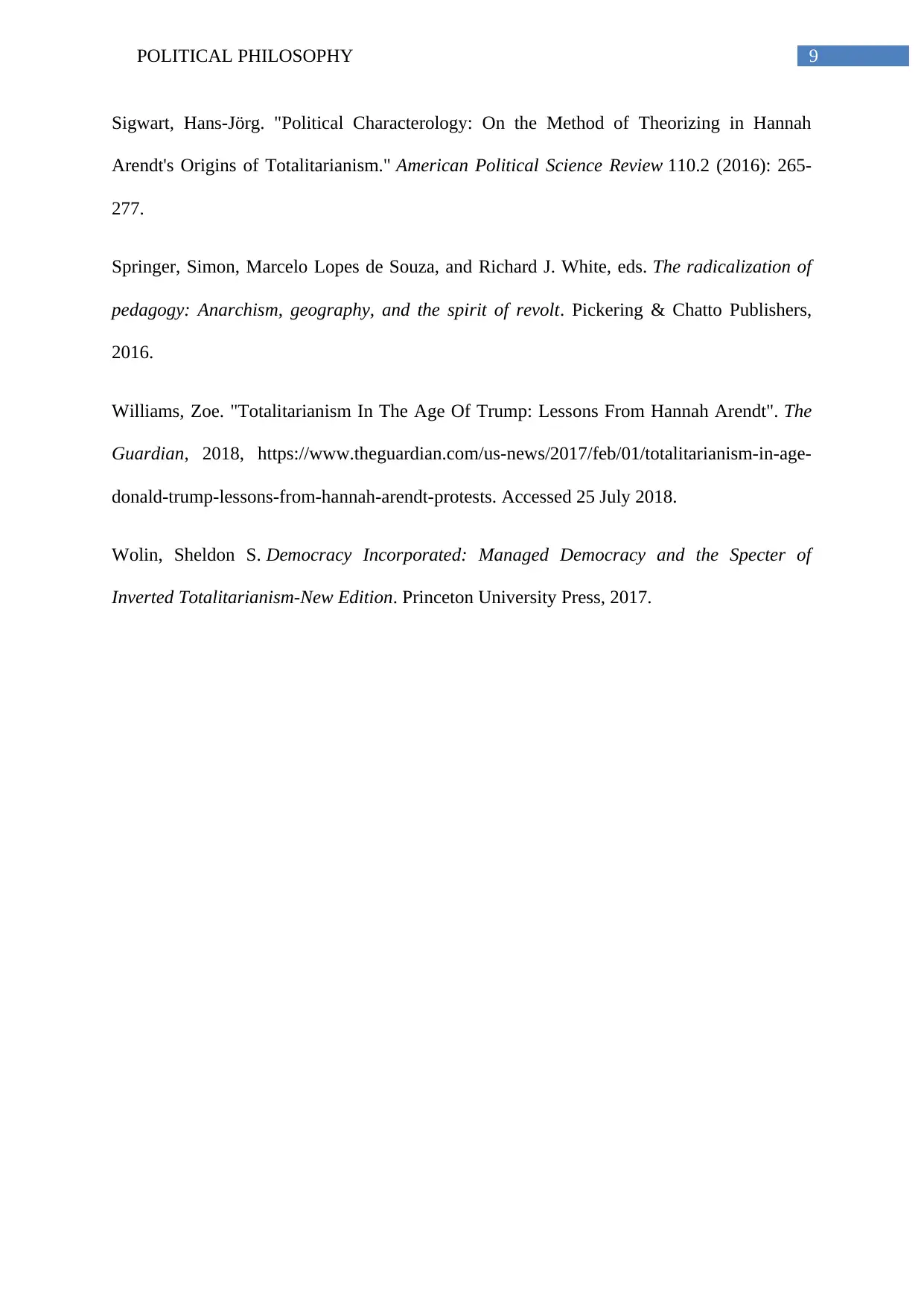
9POLITICAL PHILOSOPHY
Sigwart, Hans-Jörg. "Political Characterology: On the Method of Theorizing in Hannah
Arendt's Origins of Totalitarianism." American Political Science Review 110.2 (2016): 265-
277.
Springer, Simon, Marcelo Lopes de Souza, and Richard J. White, eds. The radicalization of
pedagogy: Anarchism, geography, and the spirit of revolt. Pickering & Chatto Publishers,
2016.
Williams, Zoe. "Totalitarianism In The Age Of Trump: Lessons From Hannah Arendt". The
Guardian, 2018, https://www.theguardian.com/us-news/2017/feb/01/totalitarianism-in-age-
donald-trump-lessons-from-hannah-arendt-protests. Accessed 25 July 2018.
Wolin, Sheldon S. Democracy Incorporated: Managed Democracy and the Specter of
Inverted Totalitarianism-New Edition. Princeton University Press, 2017.
Sigwart, Hans-Jörg. "Political Characterology: On the Method of Theorizing in Hannah
Arendt's Origins of Totalitarianism." American Political Science Review 110.2 (2016): 265-
277.
Springer, Simon, Marcelo Lopes de Souza, and Richard J. White, eds. The radicalization of
pedagogy: Anarchism, geography, and the spirit of revolt. Pickering & Chatto Publishers,
2016.
Williams, Zoe. "Totalitarianism In The Age Of Trump: Lessons From Hannah Arendt". The
Guardian, 2018, https://www.theguardian.com/us-news/2017/feb/01/totalitarianism-in-age-
donald-trump-lessons-from-hannah-arendt-protests. Accessed 25 July 2018.
Wolin, Sheldon S. Democracy Incorporated: Managed Democracy and the Specter of
Inverted Totalitarianism-New Edition. Princeton University Press, 2017.
1 out of 10
Your All-in-One AI-Powered Toolkit for Academic Success.
+13062052269
info@desklib.com
Available 24*7 on WhatsApp / Email
![[object Object]](/_next/static/media/star-bottom.7253800d.svg)
Unlock your academic potential
© 2024 | Zucol Services PVT LTD | All rights reserved.